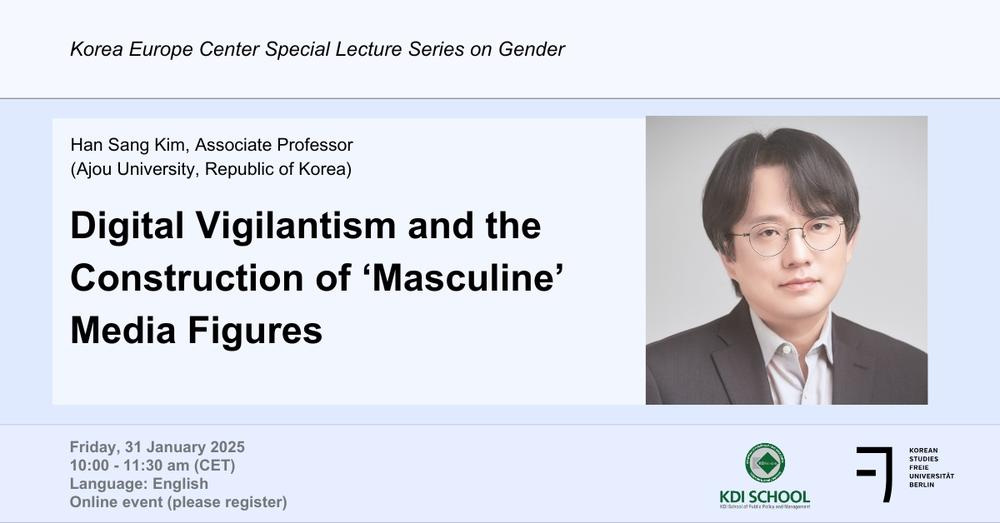KEC Special Lecture Series on Gender - Dr. Han Sang Kim (Ajou University)
Han Sang Kim, Associate professor
(Ajou University, Republic of Korea)
Lecture
Digital vigilantism refers to “a form of collective justice against a perceived transgression by an individual or group” (Allen and van Zyl 2020, 2). It is further defined as “a process where citizens are collectively offended by other citizen activity and respond through coordinated retaliation on digital media, including mobile devices and social media platforms” (Trottier 2017, 56). Initially, digital vigilantism was understood primarily in terms of activities such as doxing or the actions of so-called “netizen investigation units,” where anonymous internet users participated in collective retaliation or attacks (Lee 2014, 97–99; Namgung 2017, 10–13). Recent studies have broadened this definition to include practices such as “scambaiting, hacktivism, citizen-led cyber-stings, and crowdsourcing” (Favarel-Garrigues et al. 2020, 190; Chang and Poon 2017, 1913–1914). Moreover, it encompasses activities like “organized leaking” of information by civic actors to pressure institutions for systemic change or reform (Loveluck 2020, 7). These definitions primarily focus on collective and anonymous behaviors.
However, as video streaming platforms like YouTube have become dominant in social media, there has been increased attention on extralegal justice enacted by individual creators. These creators harness the speed, dynamism, and, most importantly, the influencer status of solo media figures. This study examines the phenomenon of so-called “cyber wreckers” (k. saibŏ rek’ŏ), individuals who position themselves as executors of justice. At first glance, this phenomenon might seem to diverge from the collective nature of digital vigilantism due to the focus on the individual’s influencer status. Nevertheless, this study, detailed in its methodology, conceptualizes cyber wreckers as collective media constructs and explores how they construct masculinized personas as “real-life superheroes” (Meade and Castle 2021, 1088). Through this perspective, the study investigates the ways in which these figures perform and embody extralegal justice in the digital age.
About the lecturer
Han Sang Kim is an associate professor of sociology and the inaugural chair of the Department of Transnational Visual Studies at Ajou University. His research and teaching interests include visual sociology, qualitative methods, migration and racism, and the sociology of film and media. He has conducted research and written on the themes of film archives, ethics of photographic representation, post/colonial visual culture, racism, and mobilities. He is the author of Cine-Mobility: Twentieth-Century Transformations in Korea’s Film and Transportation (Harvard University Asia Center, 2022) and articles published in peer-reviewed journals, including positions: asia critique, The Journal of Asian Studies, Journal of Korean Studies, Inter-Asian Cultural Studies, and several other journals in Korean. As the Vice President of the International Visual Sociology Association (IVSA), he is currently planning IVSA’s 42nd annual conference at Ajou University, Suwon, South Korea, June 25-28, 2025, the association’s first conference in East Asia.
Please register to join the lecture online: https://fu-berlin.webex.com/weblink/register/r02b0339db7868f5475a5b0fc6df6f8eb
